Best Practices for Employee Benefits in Different Life Stages
2023
→
Taking On Longevity with Market Innovation

We develop initiatives that focus on meeting the challenges of worldwide aging with groundbreaking market solutions and progressive public policies.
Through our white papers, roundtables, webinars, presentations to third parties, and other communications materials, we are leading the global aging dialogue and providing public education designed to enable healthier and more active aging.

2023
→
As the United States workforce ages – by 2060, the number of people aged 65 and
older will double – providing benefits that match an employee’s life stage becomes
increasingly important for employers trying to attract and retain talent. The needs
of employees differ greatly depending on their situation and life stage. The needs of
younger employees just entering the labor market are not the same as those of middleaged
employees juggling family and caregiving responsibilities or older employees
caring for a loved one.
As the needs of employees differ throughout their lives, so should employee benefits
throughout an employee’s career. Employers should consider structuring and adjusting
employee wellness offerings to attract and retain talent at different life stages. This
Global Coalition on Aging (GCOA) and TIAA Institute policy brief provides an overview of
best practices for employee benefits in different life stages.
2023
→
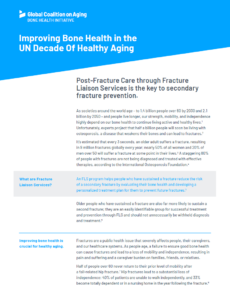 On World Osteoporosis Day 2023, the Global Coalition on Aging’s Bone Health Initiative released “Improving Bone Health in the UN Decade of Healthy Ageing,” providing a snapshot of the importance of bone health to healthy aging and the need to implement effective intervention in the form of Fracture Liaison Services, a proven, integrated model of care which provides personalized care to help prevent secondary fractures.
On World Osteoporosis Day 2023, the Global Coalition on Aging’s Bone Health Initiative released “Improving Bone Health in the UN Decade of Healthy Ageing,” providing a snapshot of the importance of bone health to healthy aging and the need to implement effective intervention in the form of Fracture Liaison Services, a proven, integrated model of care which provides personalized care to help prevent secondary fractures.
The Bone Health Initiative calls on global and national policymakers, officials in age-friendly cities and communities, healthcare professionals, patient advocacy organizations, employers concerned about the health and employability of older employees, and other societal stakeholders to join us in advocating for the adaptation and prioritization of Fracture Liaison Services to prevent secondary fractures.
2023
→
On June 6, 2023, Global Coalition on Aging Alliance for Health Innovation and Georgetown University convened a roundtable in Washington, D.C. on innovation and equity for healthy aging. During this roundtable, policymakers, experts, and patient advocates gathered to address innovation and its impact on health equity and healthy aging. This policy brief provides insights from the roundtable, including four policy principles that can guide future policy developments and highlight steps that policymakers can take to ensure everyone can access the innovations that allow people to live longer and healthier than ever:
The Global Coalition on Aging Alliance for Health Innovation brings together over 20 patient advocacy organizations, scientists, and policy specialists to establish awareness of the importance of innovation in achieving healthy aging through investments, policy reforms, and strategic partnerships – both for the value to patients and for health system sustainability.
2023
→
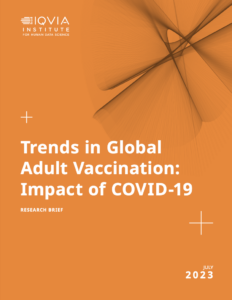 A July 2023 report from GSK, in collaboration with the IQVIA Institute for Human Data Science and the Global Coalition on Aging (GCOA) examined the impact of the COVID pandemic on the uptake of adult vaccination around the world. The report estimated approximately 100 million fewer doses of some adult vaccines (excluding Covid-19 vaccines) were administered in 2021 and 2022 than anticipated, compounding already low adoption rates pre-pandemic. Data also showed that investment in adult vaccines represent less than 2% of total pharmaceutical spending in all regions. The analysis provides new evidence on why changes are needed, given existing data that show adult vaccine-preventable diseases are a major cause of morbidity, mortality and healthcare cost.
A July 2023 report from GSK, in collaboration with the IQVIA Institute for Human Data Science and the Global Coalition on Aging (GCOA) examined the impact of the COVID pandemic on the uptake of adult vaccination around the world. The report estimated approximately 100 million fewer doses of some adult vaccines (excluding Covid-19 vaccines) were administered in 2021 and 2022 than anticipated, compounding already low adoption rates pre-pandemic. Data also showed that investment in adult vaccines represent less than 2% of total pharmaceutical spending in all regions. The analysis provides new evidence on why changes are needed, given existing data that show adult vaccine-preventable diseases are a major cause of morbidity, mortality and healthcare cost.
2023
→
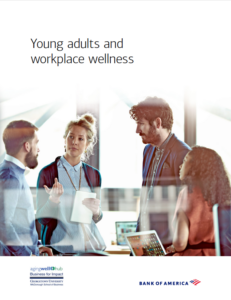 A June 2023 report from Bank of America and the AgingWell Hub at Georgetown University explored how Millennials and Gen Z are redefining “workplace wellness.” The report was based on a survey of attitudes and priorities among 1,032 working-age Gen Z and younger millennials (ages 24-35) as these young adults return to the office. The survey found that young adults are struggling financially – only 52% are confident they can retire at an age they desire. The report also found that this segment of the workforce does not have strong loyalty to their current employer – 46% say they definitely or probably will look to change jobs in the next 12 months. The report concluded that employers need to be aggressive with progressive benefits to attract and retain younger adult employees. Top priorities for young adults are flexible work schedules, better-quality benefits, employer culture/values, childcare assistance. Interestingly, 73% of young adults want benefits that are portable.
A June 2023 report from Bank of America and the AgingWell Hub at Georgetown University explored how Millennials and Gen Z are redefining “workplace wellness.” The report was based on a survey of attitudes and priorities among 1,032 working-age Gen Z and younger millennials (ages 24-35) as these young adults return to the office. The survey found that young adults are struggling financially – only 52% are confident they can retire at an age they desire. The report also found that this segment of the workforce does not have strong loyalty to their current employer – 46% say they definitely or probably will look to change jobs in the next 12 months. The report concluded that employers need to be aggressive with progressive benefits to attract and retain younger adult employees. Top priorities for young adults are flexible work schedules, better-quality benefits, employer culture/values, childcare assistance. Interestingly, 73% of young adults want benefits that are portable.
2023
→
In June 2023, GCOA released its report, “Healthy Aging in Practice: How Age-Friendly Cities & Communities Can Contribute to an Age-Friendly World,” following a roundtable held in New York City with Age Friendly Ireland, along with the United Nations Department of Social and Economic Affairs (UNDESA), the New York City Department for the Aging, and other stakeholders.
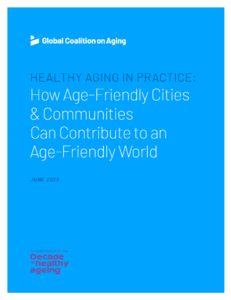
The report builds upon the discussion and a Twinning Agreement signed by Ireland and New York City, providing examples of age-friendly innovation in New York, Ireland, and around the world.
Key takeaways include:
2023
→
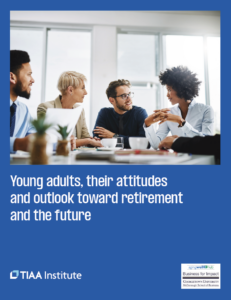 A June 2023 study by the AgingWell Hub at Georgetown University and the TIAA Institute finds many young people struggling financially: many live paycheck-to-paycheck, feel finances control their lives, and doubt they will do as well economically as their parents. This report examines attitudes and perceptions of young adults regarding global issues and their own financial future and highlights substantial differences across demographic lines. The report also provides recommendations to young adults, their employers, financial advisors, and society to help young adults secure their financial future.
A June 2023 study by the AgingWell Hub at Georgetown University and the TIAA Institute finds many young people struggling financially: many live paycheck-to-paycheck, feel finances control their lives, and doubt they will do as well economically as their parents. This report examines attitudes and perceptions of young adults regarding global issues and their own financial future and highlights substantial differences across demographic lines. The report also provides recommendations to young adults, their employers, financial advisors, and society to help young adults secure their financial future.
2023
→
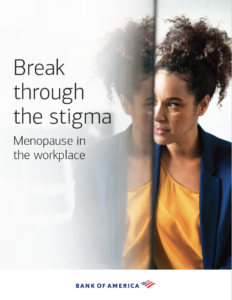 In June 2023, a new Bank of America report revealed striking disconnects between employer and employee perceptions of support around menopause. The report, developed in partnership with the National Menopause Foundation, surveyed 2,000 female workers and 500 benefit managers on menopause and its impacts in the workplace. Half of peri- and post-menopausal women (51%) reported that menopause negatively impacted their work life, yet only 14% believe their employers recognize the need for menopause-specific benefits. The underrecognized need for menopause-specific benefits comes as 20% of the workforce is in some phase of menopause transition and the number of post-menopausal women is expected to reach 1.1 billion by 2025 globally.
In June 2023, a new Bank of America report revealed striking disconnects between employer and employee perceptions of support around menopause. The report, developed in partnership with the National Menopause Foundation, surveyed 2,000 female workers and 500 benefit managers on menopause and its impacts in the workplace. Half of peri- and post-menopausal women (51%) reported that menopause negatively impacted their work life, yet only 14% believe their employers recognize the need for menopause-specific benefits. The underrecognized need for menopause-specific benefits comes as 20% of the workforce is in some phase of menopause transition and the number of post-menopausal women is expected to reach 1.1 billion by 2025 globally.
The research demonstrates the value of a menopause-specific benefit program as an imperative for future female employees and a point of differentiation in becoming an employer of choice.
2023
→
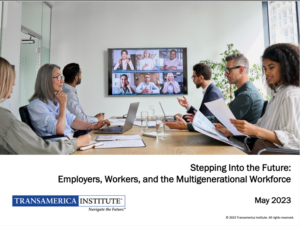 A May 2023 study by the Transamerica Institute and the Transamerica Center for Retirement Studies revealed gaps between employer offerings and employee needs in the post-pandemic workplace. Sixty-nine percent of employers cite one or more workforce-related issues as major concerns for their company’s leadership, and more than six in 10 (61%) reevaluated their health, retirement, and other benefit offerings in 2022.
A May 2023 study by the Transamerica Institute and the Transamerica Center for Retirement Studies revealed gaps between employer offerings and employee needs in the post-pandemic workplace. Sixty-nine percent of employers cite one or more workforce-related issues as major concerns for their company’s leadership, and more than six in 10 (61%) reevaluated their health, retirement, and other benefit offerings in 2022.
Stepping Into the Future: Employers, Workers, and the Multigenerational Workforce examined employers’ benefit offerings, identified employees’ unmet needs, and outlined recommendations, including best practices for the multigenerational workforce, such as flexibility and benefits to support employees who are also caregivers. The report is based on a survey of 1,800 for-profit U.S. employers including small, medium, and large companies (<100, 100 to 499, 500+ employees, respectively), and a survey of 5,700 workers in for-profit companies.
Based on the research findings, employers could address disconnects by:
2023
→
In April 2023, the Global Coalition on Aging (GCOA) convened a private workshop of experts and officials from Japan, Sweden, the United Kingdom, Italy and the United States to discuss how pull incentives within Japan and around the G7 could reinvigorate antibiotic innovation.
They found that:
2023
→
In December of 2022, Global Coalition on Aging and Global Heart Hub jointly convened a roundtable of global, multi-disciplinary experts from healthcare, patient advocacy, policy organizations, and the private sector to discuss the challenge of heart valve disease in the context of aging societies and their evolving needs.
 This position paper, Heart Valve Disease: Harnessing Innovation to Save Lives, Mitigate Costs, and Advance the Healthy Aging Agenda, is the result of the roundtable discussion and consultation with additional global experts. These experts identified critical issues to address, as well as a need for greater urgency to ensure patients and families, health systems and societies reap the full benefits of innovation, requiring:
This position paper, Heart Valve Disease: Harnessing Innovation to Save Lives, Mitigate Costs, and Advance the Healthy Aging Agenda, is the result of the roundtable discussion and consultation with additional global experts. These experts identified critical issues to address, as well as a need for greater urgency to ensure patients and families, health systems and societies reap the full benefits of innovation, requiring:
2022
→
In December 2022, the Global Coalition on Aging announced the release of its roundtable report, “AMR & Japan’s G7 Presidency: A Call for Pull Incentives to Drive Innovation.” The report is based on a small, private roundtable of leaders from the United Kingdom, the United States, and Sweden, alongside Japanese decision-makers and experts.
AMR is a crisis for all of society, but older adults are most at risk, making AMR a critical priority for super-aging Japan, where close to 40% of the population is over 60. Experts at the roundtable identified four critical actions that Japan must take to urgently address AMR as Japan assumes the 2023 G7 Presidency.
2022
→
In November 2022, the Global Coalition on Aging released its compendium, “Business Leadership in the Decade of Healthy Ageing: Compendium of Best Practices Across the Private Sector,” to highlight actions of the business community to advance the goals of the UN Decade of Healthy Ageing. While conventional perspectives on aging tend to focus on rising costs and pressure on our healthcare system, innovation across a variety of sectors are helping to shift the role that our aging population plays across society. The report details nine key areas critical to the healthy aging initiative:
The Compendium builds on the GCOA’s earlier report, “Decade of Healthy Ageing Demystified,” which aims to clarify the opportunities for the business community to engage in and help advance the goals of the Decade of Healthy Ageing. The report offers key questions and opportunities for business leaders to formulate and execute upon their aging strategies. These are organized according to the Decade’s four core action areas: combatting ageism, integrated care, age-friendly environments, and long-term care.
2022
→
 GCOA and Home Instead, the world’s largest home care network for older adults, published a global report on November 2, 2022, titled Key Insights & Proposed Solutions from the Future of Care and the Caregiving Workforce: Lessons and Insights from the COVID-19 Experience.
GCOA and Home Instead, the world’s largest home care network for older adults, published a global report on November 2, 2022, titled Key Insights & Proposed Solutions from the Future of Care and the Caregiving Workforce: Lessons and Insights from the COVID-19 Experience.
The report, based on a workshop of more than 100 global leaders from over 20 OECD member states, spotlights the challenges facing the long-term care workforce, including insights from the COVID-19 pandemic, unprecedented demand brought by the aging demographic shift, and prevailing work conditions and perceptions.
The report suggests three top priorities to grow the care workforce to meet current and future care needs:
2022
→
In October 2022, GCOA’s Bone Health Initiative (BHI) launched two white papers outlining key imperatives for advancing bone health in the Decade of Healthy Ageing.
 More Than Just a Fracture: A Call to Action on Osteoporosis and Bone Health in the Context of Healthy Aging calls for a new approach to osteoporosis diagnosis and for the WHO to drive efforts to update the way in which fragility fractures are identified and therefore how osteoporosis is acted upon globally. In doing so, the WHO — with partners in the bone health and aging spaces — has the potential to dramatically improve the quality of life for tens of millions of people worldwide as they age and reduce the soaring costs to health care systems through more effective attention to osteoporosis-related fragility fractures as an indicator of osteoporosis. The paper calls on the WHO to create a code in the International Classification of Diseases 11th Revision (ICD 11) for osteoporosis-related fragility fractures describing fractures related to deteriorated bone structure.
More Than Just a Fracture: A Call to Action on Osteoporosis and Bone Health in the Context of Healthy Aging calls for a new approach to osteoporosis diagnosis and for the WHO to drive efforts to update the way in which fragility fractures are identified and therefore how osteoporosis is acted upon globally. In doing so, the WHO — with partners in the bone health and aging spaces — has the potential to dramatically improve the quality of life for tens of millions of people worldwide as they age and reduce the soaring costs to health care systems through more effective attention to osteoporosis-related fragility fractures as an indicator of osteoporosis. The paper calls on the WHO to create a code in the International Classification of Diseases 11th Revision (ICD 11) for osteoporosis-related fragility fractures describing fractures related to deteriorated bone structure.
Healthy Bones for Healthy Aging: How the Integrated Care for Older People (ICOPE) Model Can Leverage Bone Health to Improve Well-Being, Sustain Independence and Support Health Care Financing calls attention to the importance of integrated care for older people in relation to bone health. Integrating bone health into ICOPE can revolutionize how osteoporosis is treated regarding patient outcomes and health care savings. Doing so can also help ensure a person-centered approach to osteoporosis and help prevent millions of primary and secondary fragility fractures – adding healthy life years for every affected older person. The paper outlines that a new strategy to address osteoporosis and bone health through integrated care will help empower healthy and active aging.
Through communications, education, and advocacy, the BHI focuses on aligning policy change and healthcare practices in line with 21st-century healthy aging realities to ensure the highest quality of life possible for those with or at risk of osteoporosis and, at the same time, reduce the costly impact of osteoporosis and fragility fractures on our health systems.
2022
→
On Thursday, September 29, 2022, Global Coalition on Aging, in partnership with GCOA Member Amgen, presented the Asia-Pacific Healthy Aging Summit: Advancing Disease Prediction and Prevention, which brought together leaders from the region with global leaders to find the policy solutions necessary for a healthier and more active aging across the region.
Speakers included Naoko Ueda of OECD, Roxana Widmer-Iliescu of ITU, Alana Officer of WHO, and Ryoji Noritake of Health and Global Policy Institute among many other esteemed experts and thought leaders.
2022
→
GCOA, in partnership with Renmin University, convened the first-ever China Healthy Aging Cities Forum, on July 28, 2022. The Forum highlighted positive policy actions in Beijing and other Chinese and global cities to support healthy aging, with adult immunization generally and COVID-19 vaccination success for older adults in particular as key examples.

The discussion, which brought together both Chinese and global experts, explored lessons learned from Beijing’s leadership and the changed landscape from Covid-19 vaccination and provided insights for a report on critical policy steps Beijing can take, what other Chinese cities can learn, and for application at the national level to enable healthier and more active aging, critical for a successful 21st century economy and society.
The China Healthy Aging Cities Forum and Report build on the framework of the WHO Global Network for Age-Friendly Cities and Communities and momentum from the UN Decade of Healthy Ageing, GCOA’s Silver Economy platform, and the China Development Forum interest in “Revitalizing Aging China.”
2022
→
 As our society ages, we need to ensure that older people are empowered to decide how they want to live, what they want to do, and what type of healthcare works best for their situation. Unfortunately, healthcare rationing by age, where patients are withheld access to treatments, is still one of the most widespread forms of ageism.
As our society ages, we need to ensure that older people are empowered to decide how they want to live, what they want to do, and what type of healthcare works best for their situation. Unfortunately, healthcare rationing by age, where patients are withheld access to treatments, is still one of the most widespread forms of ageism.
In September 2022, the Global Coalition on Aging and Nutricia presented a call to action to break with preconceived, ageist notions and lead to activities that empower individual healthcare engagement and decision-making regardless of age.
